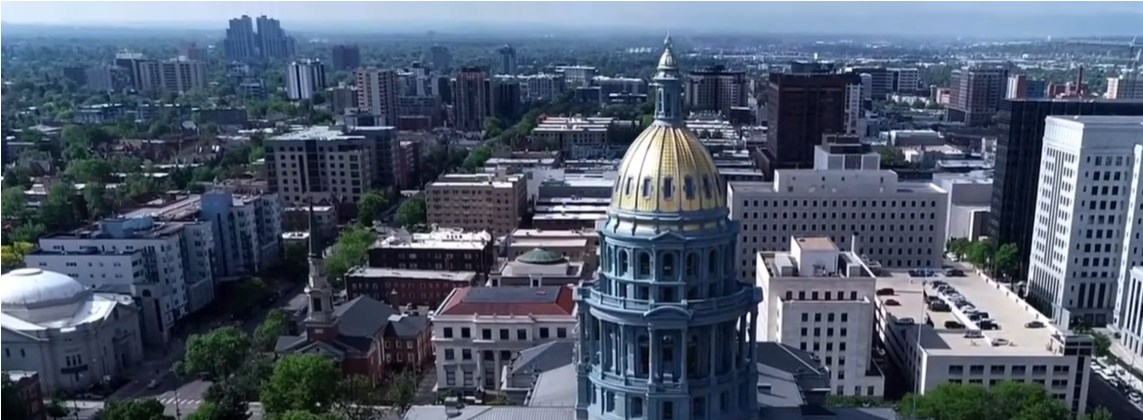Denver, the capital city of Colorado, has been affectionately dubbed the “Queen City of the Plains.” This nickname was given to the city in the early 1900s, and it has since become an integral part of Denver’s identity. There are several reasons why Denver earned this title, and they all tie into the city’s unique history and geography.
To fully understand why Denver is called the “Queen City of the Plains,” it’s important to first take a closer look at the city’s location. Denver is situated in the eastern half of Colorado, and it sits at the foot of the Rocky Mountains. While the mountains provide a stunning backdrop for the city, they also create a barrier between Denver and the rest of the state. To the east of Denver lies a vast expanse of flat, fertile land known as the Great Plains.
The Great Plains are one of the most distinctive features of North America, stretching across the center of the continent from Canada to Mexico. This region is characterized by its vast grasslands, rolling hills, and expansive skies. The Great Plains were once home to millions of bison, as well as countless Native American tribes. Today, the Great Plains are an important agricultural region, producing crops such as wheat, corn, and soybeans.
Denver’s location on the edge of the Great Plains has played a significant role in the city’s development. In the early days of the city, Denver was a hub for the mining industry. The Rocky Mountains were rich in gold, silver, and other valuable minerals, and prospectors flocked to the region in search of riches. Denver quickly became a center for mining operations, with supplies and equipment being shipped in from the east. The Great Plains provided a natural transportation corridor for these goods, and Denver quickly became a major transportation hub.
The Great Plains also played a key role in Denver’s early agricultural industry. The fertile soil of the plains was ideal for growing crops, and farmers soon began to settle in the region. Denver became a center for the distribution of agricultural goods, with produce and livestock being shipped eastward across the plains. The city’s location on the edge of the Great Plains made it an ideal location for both the mining and agricultural industries.
Another reason why Denver is called the “Queen City of the Plains” is its status as a regional cultural and economic center. Denver has long been known as a hub for the arts, with a thriving music, theater, and art scene. The city is home to several major cultural institutions, including the Denver Art Museum, the Denver Center for the Performing Arts, and the Colorado Symphony Orchestra. Denver is also a major economic center, with a diverse economy that includes industries such as healthcare, education, and technology.
Denver’s status as a regional hub is closely tied to its location on the edge of the Great Plains. The city serves as a gateway between the West and the Midwest, and it has long been an important center for transportation and commerce. Denver’s position as a regional hub has helped to attract businesses and entrepreneurs to the city, and it has helped to fuel the city’s growth and development.
Finally, Denver is called the “Queen City of the Plains” because of its unique blend of urban and rural cultures. While Denver is a bustling, modern city, it is also surrounded by vast open spaces and rural communities. The city has a strong connection to the land, and many Denverites are proud of their agricultural heritage. At the same time, Denver is a vibrant, cosmopolitan city, with a thriving arts scene, a diverse population, and a rich cultural history.
Denver earned its nickname as the “Queen City of the Plains” because of its unique location, its role as a regional hub, and its blend of urban and rural cultures. The city’s location on the edge of the Great Plains made it an important center for transportation, mining, and agriculture. Denver’s status as a regional hub has helped to attract businesses and entrepreneurs to the city, fueling its growth and development. And the city’s blend of urban and rural cultures has created a unique sense of identity that has come to define Denver and its people.
Denver’s nickname as the “Queen City of the Plains” is not just a title; it is a symbol of the city’s history, geography, and identity. The nickname reflects Denver’s important role as a regional hub and its connection to the land and the people of the Great Plains. Today, Denver continues to be a vibrant and dynamic city that embraces its heritage while looking to the future. And as the city continues to grow and evolve, its nickname will remain a testament to its unique history and identity.

